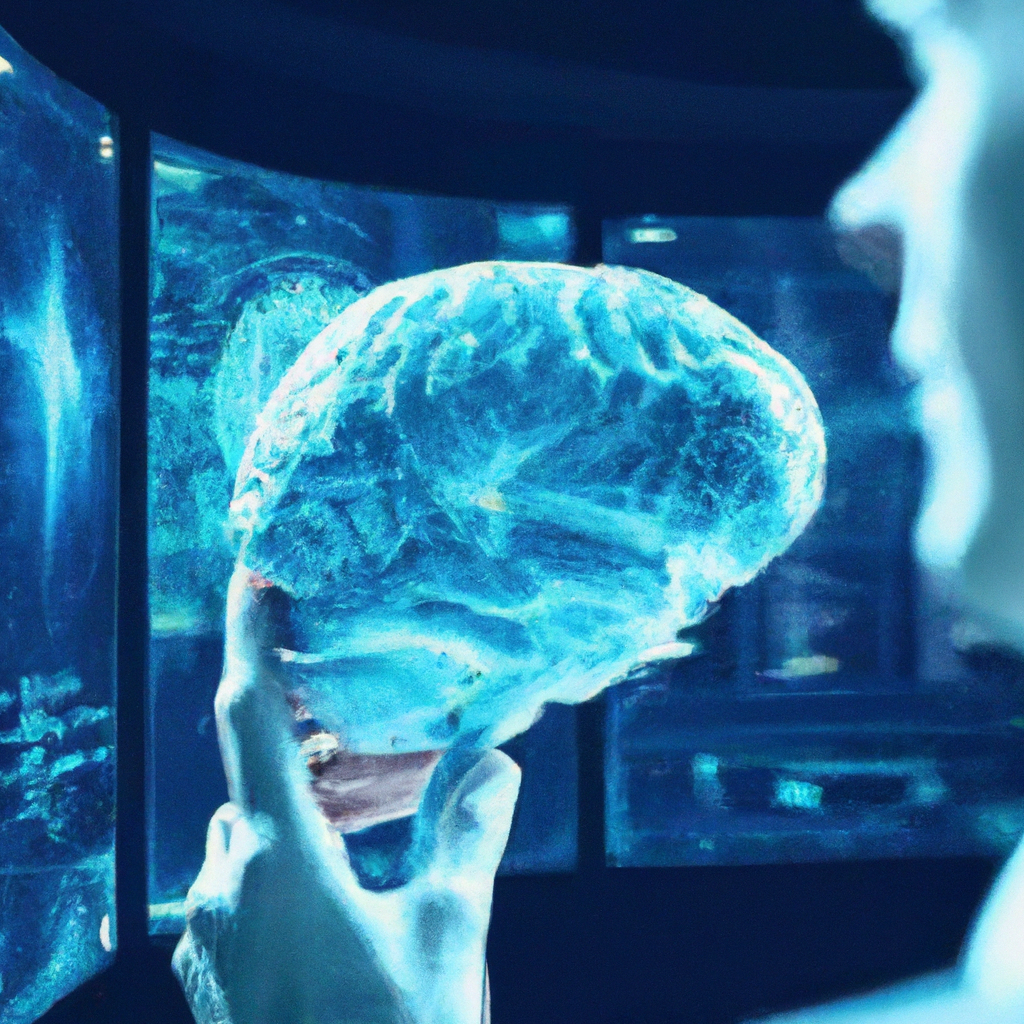Imagine a world where technology works alongside doctors, transforming healthcare as we know it. Artificial Intelligence (AI) has the potential to revolutionize the healthcare industry, and it’s already making waves. Using advanced algorithms and machine learning, AI can analyze vast amounts of medical data, detect patterns, and provide valuable insights to healthcare professionals. Whether it’s improving diagnosis accuracy, streamlining administrative tasks, or enhancing patient care, AI has the power to transform the way we approach healthcare. In this article, we will explore the various ways AI can improve healthcare and its potential to revolutionize the medical field.

This image is property of images.pexels.com.
Enhanced Diagnostics
Faster and more accurate diagnosis
AI has the potential to revolutionize the diagnostic process by making it faster and more accurate. With the help of machine learning algorithms, AI can analyze vast amounts of patient data, such as medical records, lab results, and imaging scans, to identify patterns and indicators of diseases. By analyzing this data in real-time, AI can provide doctors with immediate insights and suggestions, enabling them to make quicker and more accurate diagnoses.
Early detection of diseases
Early detection of diseases is crucial for successful treatment and improved patient outcomes. AI algorithms can analyze patient data and detect subtle changes in health indicators, such as blood pressure, heart rate, or glucose levels, that may indicate a developing illness. By identifying these early warning signs, AI can help healthcare professionals intervene and initiate appropriate treatments or preventive measures, potentially saving lives and reducing the severity of future health complications.
Improved imaging and interpretation
AI-powered imaging systems have the potential to enhance the accuracy and speed of medical imaging interpretation. By utilizing deep learning algorithms, AI can analyze medical images, such as X-rays, CT scans, or MRIs, to detect abnormalities and provide detailed insights to radiologists. This can reduce human error in interpretation and allow radiologists to focus on more complex cases, ultimately improving patient care and reducing waiting times for diagnosis.
Treatment Optimization
Personalized treatment plans
Each patient is unique, with different genetic backgrounds, medical histories, and lifestyle factors. AI can analyze vast amounts of patient data and healthcare research to develop personalized treatment plans tailored to an individual’s specific needs. By considering a patient’s genetic makeup, underlying conditions, and responses to previous treatments, AI can help healthcare professionals design and implement more effective personalized treatments, leading to better patient outcomes and minimized side effects.
Improved medication management
Medication errors and adverse drug reactions are significant issues in healthcare. AI can alleviate these problems by assisting healthcare professionals in medication management. AI algorithms can analyze patient data, such as medical history, genetic information, and current medications, to identify potential drug interactions and adverse effects. By alerting healthcare professionals about these risks, AI can help prevent medication errors and ensure patients receive appropriate and safe treatments.
Enhanced surgical procedures
AI can play a crucial role in improving surgical procedures, making them safer and more efficient. By utilizing robotics and machine learning algorithms, AI can assist surgeons in performing highly precise and minimally invasive surgeries. AI can analyze patient data, such as medical images or sensor data, to provide real-time guidance to surgeons, enabling them to make more informed decisions during surgeries. This can result in reduced surgical complications, shorter recovery times, and improved patient outcomes.
Data Analysis and Insights
Efficient analysis of patient records
Managing and analyzing large volumes of patient records can be time-consuming for healthcare professionals. AI-powered algorithms can automate the analysis of patient records, extracting relevant information and identifying patterns and trends that may not be readily apparent to human eyes. By efficiently processing and analyzing this data, AI can provide healthcare professionals with valuable insights and help them in making informed decisions about patient care.
Identifying patterns and trends
AI can analyze vast amounts of healthcare data to identify patterns and trends that may not be immediately apparent to healthcare professionals. By examining data from multiple sources, such as electronic health records, medical imaging, and genetic databases, AI algorithms can uncover hidden relationships between various factors and identify risk factors for specific diseases. This can enable healthcare professionals to take proactive measures and implement preventive interventions before the onset of a disease, ultimately improving population health.
Predictive analytics for proactive care
AI can leverage predictive analytics to anticipate potential health issues and enable proactive care. By analyzing a patient’s medical history, genetic information, lifestyle factors, and real-time data from wearables or sensors, AI algorithms can predict the likelihood of certain health conditions or incidents. This can allow healthcare professionals to intervene at an early stage, provide preventive care, or offer personalized recommendations to individuals, helping them lead healthier lives and reduce the burden on healthcare systems.
Targeted Therapeutics
Development of precision medicines
AI can accelerate the development of precision medicines, also known as personalized or targeted therapies. By analyzing vast amounts of biomedical research data, including genetic information, medical records, and clinical trial results, AI algorithms can identify potential drug targets and accelerate the drug discovery process. This can lead to the development of more effective and targeted treatment options that address individual patients’ specific genetic mutations or disease subtypes.
Delivery of targeted therapies
AI can also optimize the delivery of targeted therapies. By analyzing patient data and healthcare research, AI algorithms can determine the most suitable treatment options for individual patients. This may include identifying the optimal dosage, frequency, or combination of medications tailored to a patient’s specific needs. By delivering treatments that are precisely tailored to each patient, AI can improve treatment effectiveness and minimize adverse effects.
Monitoring treatment effectiveness
AI can assist healthcare professionals in monitoring the effectiveness of treatments in real-time. By analyzing patient data, such as symptoms, vital signs, or lab results, AI algorithms can provide continuous feedback on treatment outcomes. This can help physicians identify early signs of treatment failure or inefficiency, allowing them to adjust treatment plans promptly and improve patient outcomes.

This image is property of images.pexels.com.
Patient Monitoring and Management
Remote monitoring of patients
AI-enabled remote monitoring solutions can revolutionize the way patients’ health is monitored. By utilizing wearable devices, sensors, or smartphones, AI algorithms can collect real-time data on a patient’s vital signs, activities, and symptoms. This data can be analyzed to detect any deviations from normal patterns or indicators of potential health issues. By enabling remote monitoring, AI can provide early warnings about deteriorating health and facilitate timely interventions, ultimately reducing the need for hospital visits and improving patient comfort and convenience.
Real-time alerts for critical conditions
AI can provide real-time alerts for critical conditions, ensuring immediate attention and interventions. By continuously monitoring patients’ vital signs and comparing them to predetermined thresholds, AI algorithms can detect emergencies or acute changes in health status. In such cases, AI can issue alerts to healthcare professionals, enabling them to respond promptly and provide necessary care to the patient. This can improve patient outcomes and minimize the risks associated with critical conditions.
Improving treatment adherence
Medication adherence is a significant challenge in healthcare, affecting treatment outcomes and patient well-being. AI can help improve treatment adherence by providing personalized reminders, education, and support to patients. AI-powered chatbots or virtual assistants can deliver medication reminders, answer questions, and provide guidance on treatment plans. By offering continuous support and personalized interventions, AI can enhance patients’ understanding and motivation to adhere to prescribed treatments, ultimately improving treatment outcomes.
Virtual Assistants and Chatbots
24/7 accessible healthcare information
AI-powered virtual assistants and chatbots can provide 24/7 accessible healthcare information to individuals. By leveraging natural language processing and machine learning algorithms, these virtual assistants can answer patients’ questions, provide information about symptoms or conditions, and offer basic healthcare advice. This can empower individuals to have a better understanding of their health and make informed decisions about seeking medical care.
Assistance with appointment scheduling
AI can streamline and automate appointment scheduling processes, making them more convenient for patients and healthcare professionals alike. AI-powered systems can analyze healthcare providers’ availability, match it with patients’ preferences, and autonomously schedule appointments. This can save time and reduce the administrative burden for both patients and healthcare staff, ensuring that appointments are efficiently booked and managed.
Answering FAQs and providing guidance
Virtual assistants and chatbots equipped with AI algorithms can serve as a valuable resource for answering frequently asked questions and providing guidance to patients. By utilizing medical knowledge bases and machine learning algorithms, these virtual assistants can deliver accurate and personalized information to individuals. This can help address common concerns, deliver immediate support, and reduce unnecessary visits to healthcare facilities.

This image is property of images.pexels.com.
Streamlined Administrative Tasks
Automated data entry and documentation
AI can automate data entry and documentation tasks, reducing the administrative burden on healthcare professionals. By utilizing natural language processing and speech recognition technologies, AI algorithms can transcribe spoken notes, extract relevant information from medical records, and input data directly into electronic health records. This can save time, improve data accuracy, and allow healthcare professionals to focus more on patient care rather than paperwork.
Efficient scheduling and resource management
AI-powered systems can optimize scheduling and resource management in healthcare facilities. By analyzing patient data, healthcare provider availability, and resource requirements, AI algorithms can automatically schedule appointments, allocate resources, and optimize workflows. This can reduce waiting times, ensure efficient utilization of resources, and improve patient satisfaction.
Reduced paperwork and administrative burden
AI can significantly reduce paperwork and administrative tasks in healthcare. By automating routine administrative tasks, such as scheduling, billing, or insurance verification, AI algorithms can save time, minimize errors, and improve overall efficiency. This allows healthcare professionals to devote more time to patient care, enhance the quality of services provided, and alleviate administrative burdens.
Fraud Detection
Identification of fraudulent claims and activities
AI can play a crucial role in identifying and preventing healthcare fraud. By analyzing vast amounts of healthcare data and claim records, AI algorithms can detect patterns and anomalies indicative of fraudulent activities, such as billing fraud, unnecessary medical procedures, or prescription drug abuse. By flagging suspicious claims and activities, AI can assist healthcare organizations and regulatory bodies in investigating and preventing fraud, saving significant amounts of money and protecting the integrity of healthcare systems.
Monitoring of healthcare system for anomalies
AI can continuously monitor healthcare systems for anomalies and irregularities. By analyzing various data sources, such as electronic health records, insurance claims, or supply chain data, AI algorithms can identify unusual patterns or behaviors that may indicate fraudulent activities or cybersecurity breaches. By providing real-time alerts and insights, AI can help healthcare organizations proactively address potential risks and protect patient data and systems’ security.
Preventing and reducing healthcare fraud
Through its proactive monitoring and identification capabilities, AI can help prevent and reduce healthcare fraud. By assisting investigators in identifying fraud patterns, suspicious claims, or irregularities in billing processes, AI algorithms can enable healthcare organizations to take timely actions and prevent fraudulent activities. This can lead to significant cost savings, as well as increased trust and confidence in the healthcare system among patients and stakeholders.

Medical Research and Drug Discovery
Accelerated drug discovery process
AI has the potential to accelerate the drug discovery process significantly. By analyzing vast amounts of biomedical research data, AI algorithms can identify potential drug targets and predict the effectiveness of different compounds. This can reduce the time and cost required for traditional trial-and-error drug development approaches. AI can also facilitate the repurposing of existing drugs for new indications, unlocking new treatment options and expediting the availability of therapies for patients.
Identification of potential drug targets
AI algorithms can analyze complex biological data and identify potential drug targets that traditional methods may overlook. By considering multiple factors, including genetic information, protein interactions, or disease mechanisms, AI can uncover novel insights and identify promising targets for therapeutic intervention. This can lead to the development of innovative treatments for various diseases that were previously difficult to target.
Improvement in clinical trials and research
AI can enhance the design and conduct of clinical trials and research studies. By utilizing predictive analytics, AI algorithms can identify suitable patient populations, optimize trial protocols, and predict patient responses to interventions. This can expedite the recruitment process, improve trial efficiency, and generate more robust and reliable research outcomes. AI can also contribute to real-world evidence generation by analyzing electronic health records, patient-reported outcomes, and other data sources, providing valuable insights into treatment effectiveness and safety.
Ethical and Privacy Considerations
Ensuring patient privacy and data security
As AI becomes more integrated into healthcare systems, ensuring patient privacy and data security is of utmost importance. AI algorithms must be developed and deployed in compliance with strict security protocols and privacy regulations. Measures such as data anonymization, encryption, and secure data storage should be implemented to protect patient information and prevent unauthorized access or breaches. Transparency in data handling practices and obtaining informed consent from patients are also vital in addressing privacy concerns.
Addressing bias and algorithmic fairness
AI algorithms are trained on vast amounts of data, which may inadvertently contain biases or reflect existing healthcare disparities. It is crucial to address these biases and ensure algorithmic fairness in healthcare AI systems. Careful evaluation of training data, regular monitoring of AI outputs for potential biases, and ongoing refinement of algorithms can help mitigate these issues. It is essential to strive for an equitable and unbiased healthcare AI ecosystem that provides fair and equal access to quality care for all individuals.
Ethical implications of AI in healthcare
The increasing use of AI in healthcare raises important ethical considerations. Healthcare AI systems must adhere to ethical principles, such as beneficence, respect for autonomy, and justice. The ethical implications of AI in healthcare include ensuring fairness in resource allocation, maintaining patient confidentiality, and preserving the doctor-patient relationship. Additionally, transparency in AI algorithms, informed consent from patients, and ethical oversight and regulation are vital in upholding ethical standards in the use of AI in healthcare.
In conclusion, AI has the potential to revolutionize healthcare in various ways. From enhanced diagnostics and treatment optimization to data analysis and insights, AI can empower healthcare professionals and improve patient outcomes. However, it is essential to address ethical and privacy considerations, ensuring that AI technologies are developed and deployed in a responsible and equitable manner. With careful implementation and continued advancements, AI can provide immense value in transforming healthcare delivery and making it more efficient, accessible, and personalized.
